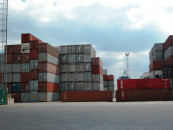Pursuing digital dividends with high tax rates
Pakistan needs to find balance to realise IT sector’s potential .

Pakistan needs to find balance to realise IT sector’s potential. PHOTO: AFP
However, Pakistan stands as one of the few countries that tax IT goods, thereby restricting their potential benefits.
The proliferation of world wide web has led to economic dividends, which the experts call ‘digital dividends’.
According to the World Bank’s World Development Report 2016, the absorption of internet and IT technologies by developing countries has been much faster than previous innovations. It took more than 50 years for a large number of developing countries to have access to electricity, but the proliferation of mobile phones took only a few years. Today, internet is considered as part and parcel of the country’s infrastructure and indispensible factor of production.
Access to internet has also been included in the Sustainable Development Goals of the United Nations, which has been adopted by 193 member states including Pakistan. The potential of digital connectivity has led to massive investments in information and communication technology. Despite this, there are serious concerns that the spreads of digital dividends have not been even.
Still more than half of the population that resides predominantly in developing countries like Pakistan have no access to the internet that has led to a digital divide and increase in inequality.
Exception to the rule
Policymakers in a large number of developing countries are cognisant of the fact that bridging the digital divide or enabling digital inclusion is important in reducing inequality and poverty. This has led to considerable interest amongst countries in joining the WTO’s Information Technology agreement that has led to increase in the trade of IT products globally.
The WTO’s IT agreement commits the signatories to eliminate tariff on IT goods, that would not only help reduce the cost of IT products, but also help increase use of IT for individuals, businesses, and governments.
Pakistan is one of the few exceptions in the developing countries that have not joined the WTO’s IT agreement due to lack of consensus amongst stakeholders in eliminating import tariffs.
Pakistan heavily relies on taxes on international trade for revenue generation. At present, the total revenue collected by Pakistan on levying tariffs and other taxes on imports contributes as much as 45% of federal government’s total revenues.

Other than high import duties, Pakistan also levies General Sales Tax, Federal Excise Duty, and Withholding Tax on telecom services.
The State Bank in its latest report on the state of economy has also highlighted the impact of high tax incidence on telecom sector. It sees heavy taxation in this sector as an impediment for growth.
The global mobile density is at 95%. In Pakistan the average is around 62% where there are 125 million mobile phone users out of which 30 million have smart devices connected to 3G services.
Policy prescription
One of the important factors identified by experts in low mobile density is excessive taxation, especially indirect taxes which are regressive in nature and have high incidence relative to incomes for poor segments of the society.
The consumers of mobile services, including 3G, pay as much as 30% taxes on the consumption of the services. The incidence of this tax is very high compared to the global average of 20%. Pakistan is on 8th position in the list of countries that tax consumers for mobile services. Furthermore, total taxes paid by mobile companies in Pakistan amount to 37% of their total revenues as against the global average of 32%.
The policy prescription being advocated by experts for bridging digital divide is to exempt duties and taxes on IT goods and services. Pakistan may not have sufficient fiscal space to exempt these taxes but there is sufficient evidence to bring it to global averages to make services affordable to a larger segment of the population. The revenue loss in the short run would be compensated in the long run through higher productivity, increase in employment and economic growth.
The writer is a development professional with over 20 years experience in public and development sectors
Published in The Express Tribune, April 18th, 2016.
Like Business on Facebook, follow @TribuneBiz on Twitter to stay informed and join in the conversation.


















COMMENTS
Comments are moderated and generally will be posted if they are on-topic and not abusive.
For more information, please see our Comments FAQ